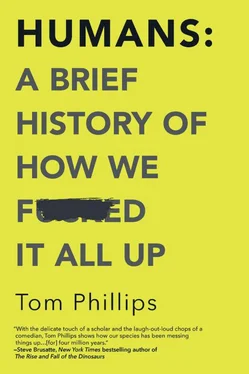Tom Phillips - Humans - A Brief History of How We F*cked It All Up
Здесь есть возможность читать онлайн «Tom Phillips - Humans - A Brief History of How We F*cked It All Up» весь текст электронной книги совершенно бесплатно (целиком полную версию без сокращений). В некоторых случаях можно слушать аудио, скачать через торрент в формате fb2 и присутствует краткое содержание. Город: Toronto, Год выпуска: 2019, ISBN: 2019, Издательство: Hanover Square Press, Жанр: История, Юмористические книги, на английском языке. Описание произведения, (предисловие) а так же отзывы посетителей доступны на портале библиотеки ЛибКат.
- Название:Humans: A Brief History of How We F*cked It All Up
- Автор:
- Издательство:Hanover Square Press
- Жанр:
- Год:2019
- Город:Toronto
- ISBN:978-1-48805-113-5
- Рейтинг книги:4 / 5. Голосов: 1
-
Избранное:Добавить в избранное
- Отзывы:
-
Ваша оценка:
- 80
- 1
- 2
- 3
- 4
- 5
Humans: A Brief History of How We F*cked It All Up: краткое содержание, описание и аннотация
Предлагаем к чтению аннотацию, описание, краткое содержание или предисловие (зависит от того, что написал сам автор книги «Humans: A Brief History of How We F*cked It All Up»). Если вы не нашли необходимую информацию о книге — напишите в комментариях, мы постараемся отыскать её.
Humans: A Brief History of How We F*cked It All Up — читать онлайн бесплатно полную книгу (весь текст) целиком
Ниже представлен текст книги, разбитый по страницам. Система сохранения места последней прочитанной страницы, позволяет с удобством читать онлайн бесплатно книгу «Humans: A Brief History of How We F*cked It All Up», без необходимости каждый раз заново искать на чём Вы остановились. Поставьте закладку, и сможете в любой момент перейти на страницу, на которой закончили чтение.
Интервал:
Закладка:
As a tale, it lends itself to metaphor. I mean, it’s the story of a country turning away from a political union with its closest geographical trading partners in favor of a fantasy vision of unfettered global influence promoted by free-trade zealots with dreams of empire, who wrapped their vague plans in the rhetoric of aggrieved patriotism while consistently ignoring expert warnings about the practical reality of the situation.
Unfortunately, I can’t think of anything that could be a metaphor for right now.
A French explorer who, while becoming the first Frenchman to circumnavigate the globe, got as far as the Great Barrier Reef but turned back, thus failing to discover Australia.
A Welsh explorer who spent five years in the 1790s searching for a lost Welsh tribe in America, during which he was imprisoned as a spy by the Spanish, before eventually finding the tribe—the Mandan—and discovering they weren’t Welsh.
A Canadian explorer who believed that the Arctic was actually a pretty hospitable place, and led an expedition there in 1913. When his ship got stuck in the ice, he told his men he was leading a small party to find food, and then promptly abandoned them.
In 1930, Lasseter led a search party into the central Australian desert in search of a vast “reef” made of pure gold that he claimed to have found years before. There’s no such thing. Eventually the rest of his party abandoned him, then his camels ran away while he was doing a poo, and he died.
A Swedish engineer and adventurer, Salomon Andrée came up with the excellent idea of reaching the North Pole by hydrogen balloon—and set off despite the fact that the balloon was leaking gas. He and his crew died somewhere in the Arctic.
8
A Dummies’ and/or Current Presidents’ Guide to Diplomacy
As global travel exploded in the Age of Discovery, so, too, did the opportunities for accidentally starting all manner of wars, as it dramatically increased the number of countries you could infuriate. On the assumption that, at least sometimes, you do actually want to avoid having wars, then (short of doing whatever the unclear thing was that the Harappan people did) your best bet is diplomacy. Diplomacy is the art of large groups of humans not being wankers to each other—or at the very least, managing to agree that okay, everybody is a wanker sometimes, but why don’t we try to take it down a notch.
Unfortunately, we’re not very good at that, either.
The key problem with international relations stems from a more general and fundamental problem of human interactions, namely that it involves two basic principles:
1)It is a good idea to trust people.
2)But not too much!
This is the dilemma that haunts pretty much every moment of contact between different cultures in history. Unfortunately for the people living in those moments, there’s no way of knowing which choice will be the right one. That’s a problem we’ve still not quite figured out, but at least we have the luxury of looking back at people’s choices in the past and going, “Nope, definitely the wrong call.”
It’s the problem that the Taíno faced when Columbus came along—during their first meetings, they were trusting, and impressed Columbus with their friendliness and generosity. Obviously Columbus reacted in the normal way you do when someone is friendly and generous to you: “They should make good servants,” he mused, adding after thinking about it for a few more days that “with fifty men they can all be subjugated and made to do what is required of them.” Lovely chap.
Roughly the same thing played out on a grander scale some decades later, when the Aztec ruler Moctezuma made a very, very bad decision about the intentions of Hernán Cortés.
The Aztecs (or Mexica, as they called themselves) ruled a large empire that stretched from coast to coast across what is now central Mexico. Moctezuma led it from the city-state of Tenochtitlan, the largest and most advanced city on the continent (it’s where Mexico City stands today). Everything was going pretty well for them until 1519, when Cortés landed on the Yucatán coast.
Cortés was not just a conquistador, but a rogue conquistador—he’d actually been removed of his command of the exploratory mission by the Spanish governor of Cuba, who didn’t trust him, but Cortés just took the boats and the crew and went, anyway. A while after his arrival, he deliberately sank the boats to stop his crew mutinying and heading back to Cuba. What I’m saying here is, Hernán Cortés was not a team player. And at this point, on the run from his own countrymen and with no way to get home, he’d pretty much used up any options that weren’t “conquer stuff.”
When Moctezuma heard of Cortés’s arrival, some 200 miles from Tenochtitlan, he was understandably nervous. Unfortunately, he couldn’t decide what to do. He vacillated between sending Cortés lavish gifts and sending him warnings to stay the hell away. Cortés, meanwhile, was busy exploiting the Mexica’s weaknesses. The main problem was: they were an empire, too, and an often quite brutal one. As such, there were plenty of native groups in Mexico who weren’t big fans of Moctezuma, and as Cortés made his way inland he used a combination of smooth talking, trickery and occasional mass slaughter to persuade them to ally with him against Tenochtitlan.
All this should probably have been a sign to Moctezuma that things were probably not going to end in a new era of friendship, but still he waited. It’s possible that his uncertainty was increased by the supposedly widespread belief that Cortés might be the returned incarnation of the sky god Quetzalcoatl—although the only actual evidence that anybody believed this is that Cortés talks a lot about it in his letters, and frankly it sounds like the sort of bullshit he’d say.
When Cortés finally arrived at Tenochtitlan, accompanied by a few hundred Spanish soldiers and a load of his new allies, Moctezuma finally made his decision, despite lots of advisers telling him this was a really bad idea. In fairness, it’s not clear if there was a right decision he could have made, but this was definitely the wrong one: he invited the Spanish in as honored guests. He showered them with gifts, he gave them the best rooms, the works. This did not end well. Within a couple of weeks, Cortés staged a coup, took Moctezuma hostage in his own court and forced him to rule as a puppet. The first thing the Spanish demanded was dinner; after that, they promptly insisted he tell them where all the gold was kept.
It all blew up a few months into 1520, ironically while Cortés was away fighting a large regiment of Spanish troops who’d been sent by the governor of Cuba to try and stop whatever the hell it was he was doing. One of Cortés’s lieutenants who’d been left behind to keep Tenochtitlan under the thumb decided, for no clear reason, to massacre a large number of Mexica nobles in the Great Temple while they were celebrating a religious festival. Outraged at the slaughter, the Mexica people revolted, and Cortés returned to face an uprising. He ordered Moctezuma to tell his people to cease hostilities. They didn’t, and that was the end for Moctezuma. Spanish accounts say that he was stoned to death by an angry crowd of his own people; in all likelihood, he was actually murdered by the Spanish when it became clear he was no longer any use as a puppet. Just over a year of bloody fighting later, the Spanish had entirely conquered the Mexica, and Cortés—suddenly back in favor with his bosses—was made the governor of Mexico.
Читать дальшеИнтервал:
Закладка:
Похожие книги на «Humans: A Brief History of How We F*cked It All Up»
Представляем Вашему вниманию похожие книги на «Humans: A Brief History of How We F*cked It All Up» списком для выбора. Мы отобрали схожую по названию и смыслу литературу в надежде предоставить читателям больше вариантов отыскать новые, интересные, ещё непрочитанные произведения.
Обсуждение, отзывы о книге «Humans: A Brief History of How We F*cked It All Up» и просто собственные мнения читателей. Оставьте ваши комментарии, напишите, что Вы думаете о произведении, его смысле или главных героях. Укажите что конкретно понравилось, а что нет, и почему Вы так считаете.












